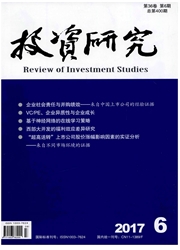

 中文摘要:
中文摘要:
本文以后续业绩为标准对会计选择的作用进行检验,并寻找影响会计选择作用性质的关键因素,以探索治理机会主义行为的新思路。国内研究通常以动机性质来推断会计选择的作用,因此倾向于将会计选择视为机会主义行为。然而,现有研究并没有提供会计选择作用的实证证据。本文发现,虽然从整体来看,会计选择的负面作用占据主导地位;但是,随着会计准则和内部控制制度的不断完善,会计选择的负面作用显著下降。考虑信息披露方式,会计选择并没有直接产生负面作用。会计选择的负面作用主要来自于信息披露较为迟缓的公司。若公司信息披露较为及时,会计选择能够传递管理人员的私有信息。
 英文摘要:
英文摘要:
Accounting choices are always viewed as opportunistic. While extant literature proves that accounting choices are re- lated to opportunistic motives, there is few research focuses on the consequences. This paper finds out that accounting choice has negative impacts on subsequent performance. It is rational to view accounting choice as opportunistic. However, account- ing choice conveys private information and has positive effect when information is disclosed early. As the institution betters, the negative effects from accounting choice are diminishing. When transparency of disclosure is considered, the negative ef- fects are mainly from companies who disclose information late.
 同期刊论文项目
同期刊论文项目
 同项目期刊论文
同项目期刊论文
 期刊信息
期刊信息
